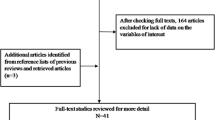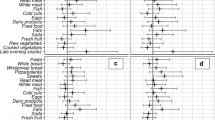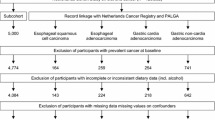Abstract
Objective
Increased consumption of carbonated soft drinks has been hypothesized to be a risk factor for esophageal adenocarcinoma (EAC); however, previous studies have not found supportive evidence. We analyzed data from a population-based case–control study to measure the association between carbonated beverage intake and risk of adenocarcinomas and squamous cell carcinoma (SCC) of the esophagus.
Methods
A food frequency questionnaire (FFQ) was used to collect data on carbonated soft drink and beer consumption; a self-administered questionnaire was used to collect information on demographic, socioeconomic, and lifestyle-related factors from 1,484 control subjects, 294 cases with EAC, 325 cases with adenocarcinoma of the esophagogastric junction (EGJAC), and 238 cases with SCC of the esophagus. We calculated odds ratios (ORs) and 95% confidence intervals (CIs) using unconditional multivariable logistic regression, adjusting for confounders.
Results
High intake of soft drinks was not associated with risk of EAC (fully adjusted OR = 0.94, 95% CI 0.53–1.66, p for trend = 0.85) or EGJAC (fully adjusted OR = 1.07, 95% CI 0.67–1.73, p for trend = 0.89) but was inversely associated with SCC of the esophagus (fully adjusted model OR = 0.40, 95% CI 0.20–0.78, p for trend = 0.04). High intake of beer was inversely associated with risk of EGJAC (fully adjusted OR = 0.53, 95% CI 0.35–0.81) but positively associated with esophageal SCC (fully adjusted model OR = 1.86, 95% CI 1.17–2.95).
Conclusion
High levels of consumption of carbonated soft drinks do not appear to increase the risk of either adenocarcinomas or SCC of the esophagus.
Similar content being viewed by others
References
Parkin DM, Bray F, Ferlay J, Pisani P (2005) Global cancer statistics, 2002. CA Cancer J Clin 55(2):74–108
Bollschweiler E, Wolfgarten E, Gutsschow C, Hölscher AH (2001) Demographic variation in the rising incidence of esophageal adenocarcinoma in white males. Cancer 92:549–555
Mallath MK (2004) Rise of esophageal adenocarcinoma in USA is temporally associated with the rise in carbonated soft drink consumption. Digestive Disease Week Annual Meeting (Abstract)
Feldman M, Barnett C (1995) Relationships between the acidity and osmolality of popular beverages and reported postprandial heartburn. Gastroenterology 108:125–131
Hamoui N, Lord RV, Hagen JA, Theisen J, DeMeester TR, Crookes PF (2006) Response of the lower esophageal sphincter to gastric distension by carbonated beverages. J Gastrointest Surg 10:870–877
Lagergren J, Bergstrom R, Lindgren A, Nyren O (1999) Symptomatic gastroesophageal reflux as a risk factor for esophageal adenocarcinoma. N Engl J Med 340:825–831
Mayne ST, Risch HA, Dubrow R, Chow WH, Gammon MD, Vaughan TL et al (2006) Carbonated soft drink consumption and risk of esophageal adenocarcinoma. J Natl Cancer Inst 98:72–75
Lagergren J, Viklund P, Jansson C (2006) Carbonated soft drinks and risk of esophageal adenocarcinoma: a population-based case-control study. J Natl Cancer Inst 98:1158–1161
Gallus S, Talamini R, Fernandez E, Dal Maso L, Franceschi S, La Vecchia C (2006) Re: carbonated soft drink consumption and risk of esophageal adenocarcinoma. J Natl Cancer Inst 98(9):645–646
Whiteman DC, Sadeghi S, Pandeya N, Smithers BM, Gotley DC, Bain CJ et al (2007) Combined effects of obesity, acid reflux and smoking on the risk of adenocarcinomas of the oesophagus. Gut published online 11 Oct [Epub ahead of print]
Spechler SJ, Dixon MF, Genta R, Hainaut P, Lambert R, Siewert R (2000) Adenocarcinoma of the oesophago-gastric junction. In: Hamilton SR, Aaltonen LA (eds) Pathology and genetics of tumours of the digestive system. WHO classification of tumours, vol.2, Lyon, IARC Press
Willett W, Sampson L, Stampfer MJ, Rosner B, Bain C, Witschi J et al (1985) Reproducibility and validity of a semiquantitative food frequency questionnaire. Am J Epidemiol 122:51–65
Ashton BA, Marks GC, Battistutta D, Green AC, The Nambour Study Group (1996) Under reporting of energy intake in two methods of dietary assessment in the Nambour trial. Aust J Nutr Diet 53:53–60
Marks GC, Hughes MC, van der Pols JC (2006) Relative validity of food intake estimates using a food frequency questionnaire is associated with sex, age, and other personal characteristics J Nutr 136:459–465
McNaughton SA, Marks GC, Gaffney P, Williams G, Green AC (2005) Validation of a food-frequency questionnaire assessment of carotenoid and vitamin E intake using weighed food records and plasma biomarkers: the method of triads model. Eur J Clin Nutr 59:211–218
Marks GC, Hughes MC, van der Pols JC (2006) The effect of personal characteristics on the validity of nutrient intake estimates using food frequency questionnaire Public Health Nutr 9:394–402
National Foods Authority (1995) NUTTAB95 database. National Food Authority, Canberra
Meyerhardt JA, Heseltine D, Campos H, Holmes MD, Willett W, Winer EP et al (2005) Assessment of a dietary questionnaire in cancer patients receiving cytotoxic chemotherapy. J Clin Oncology 23:8453–8460
Rosner SA, Akesson A, Stampfer MJ, Wolk A (2007) Coffee consumption and risk of myocardial infarction among older Swedish women. Am J Epidemiol 165:288–293
Wu K, Hu B, Fuchs C, Rimm EB, Willett WC, Giovannucci E (2004) Dietary patterns and risk of colon cancer and adenocarcinoma in a cohort of men (United States). Cancer Causes Control 15:853–862
Gammon MD, Schoenberg JB, Ahsan H, Risch HA, Vaughan TL, Chow WH et al (1997) Tobacco, alcohol, and socioeconomic status and adenocarcinomas of the oesophagus and gastric cardia. J Natl Cancer Inst 89:1277–1284
Vaughan TL, Davis S, Kristal A, Thomas DB (1995) Obesity, alcohol, and tobacco as risk factors for cancers of the esophagus and gastric cardia: adenocarcinoma versus squamous cell carcinoma. Cancer Epidemiol Biomarkers Prev 4:85–92
Engel LS, Chow W-H, Vaughan TL, Gammon MD, Risch HA, Stanford JL et al (2003) Population attributable risks of esophageal and gastric cancers. JNCI 95(18):1404–1413
Food Standards Australia New Zealand (2004) Consumption of intense sweeteners in Australia and New Zealand. Roy Morgan Research Report March, Canberra
Acknowledgements
We thank Nirmala Pandeya and Shahram Sadeghi for their assistance with programming and Harish Babu for his assistance with pathology abstractions. This study was supported by the Cancer Council Queensland and the National Health and Medical Research Council (NHMRC) of Australia (Program no. 199600). David Whiteman and Penelope Webb are supported by Senior Research Fellowships from the National Health and Medical Research Council of Australia and Cancer Council Queensland, respectively. The funding bodies played no role in the design or conduct of the study; the collection, management, analysis, or interpretation of the data; or preparation, review, or approval of the manuscript. None of the authors had a personal or financial conflict of interest.
Author information
Authors and Affiliations
Consortia
Corresponding author
Additional information
The Australian Cancer Study: Oesophageal Cancer
Investigators: David C. Whiteman MBBS, PhD; Penelope M. Webb MA, D Phil; Adele C. Green MBBS, PhD; Nicholas K. Hayward PhD; Peter G. Parsons PhD; David M. Purdie PhD.
Clinicalcollaborators: B. Mark Smithers FRACS, David Gotley FRACS PhD, Andrew Clouston FRACP PhD, Ian Brown FRACP.
ProjectManager: Suzanne Moore RN, MPH.
Database: Karen Harrap BIT, Troy Sadkowsky BIT.
ResearchNurses: Suzanne O’Brien RN MPH, Ellen Minehan RN, Deborah Roffe RN, Sue O’Keefe RN, Suzanne Lipshut RN, Gabby Connor RN, Hayley Berry RN, Frances Walker RN, Teresa Barnes RN, Janine Thomas RN, Linda Terry RN MPH, Michael Connard BSc, Leanne Bowes BSc, MaryRose Malt RN, Jo White RN.
Rights and permissions
About this article
Cite this article
Ibiebele, T.I., Hughes, M.C., O’Rourke, P. et al. Cancers of the esophagus and carbonated beverage consumption: a population-based case–control study. Cancer Causes Control 19, 577–584 (2008). https://doi.org/10.1007/s10552-008-9119-8
Received:
Accepted:
Published:
Issue Date:
DOI: https://doi.org/10.1007/s10552-008-9119-8




